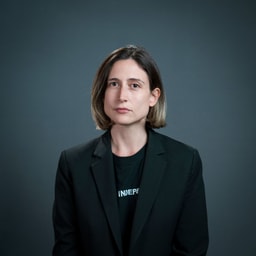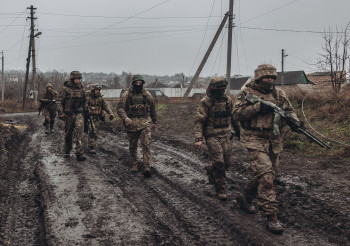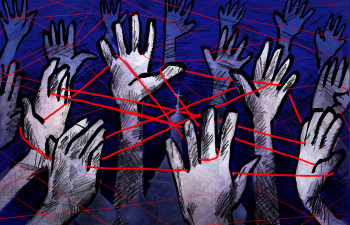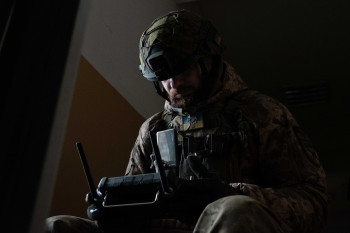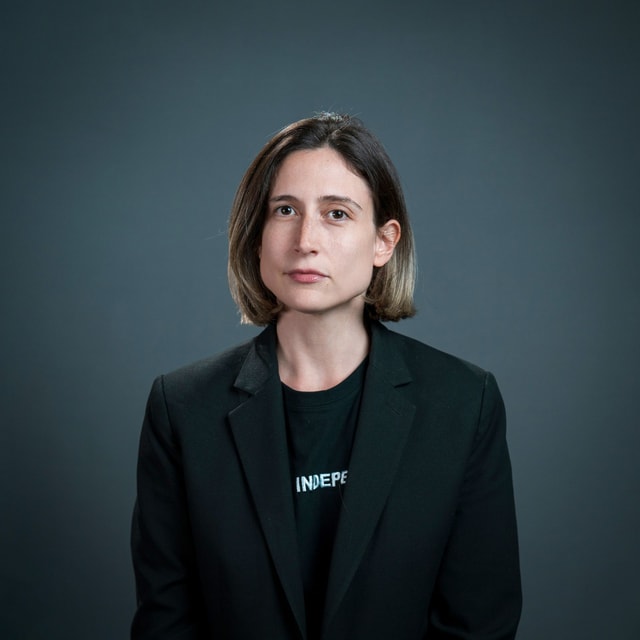Ukraine’s ambassador to US: ‘It's either fight and liberate Ukraine or die. And we choose not to die.’
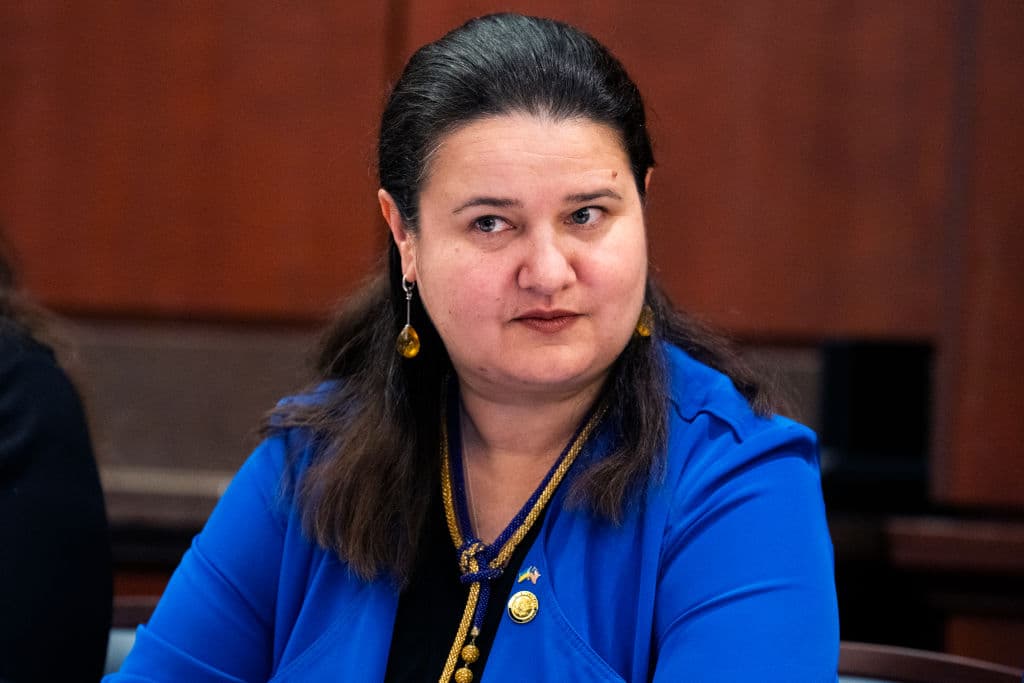
Ukraine’s Ambassador to the United States has just about as much trouble answering the question “how are you?” as many Ukrainians these days.
“I usually tell people we are kicking, fighting, but to say that we are fine is hard,” Oksana Markarova told the Kyiv Independent during our first conversation over Zoom from her office in Washington, D.C. in late November.
In between near 24/7 work with the Pentagon to secure much-needed weapons for Ukraine’s fight against Russia, the ambassador says she is able to get in touch with her family, affected by Russia’s constant attacks on Ukraine’s energy infrastructure, when they have power.
“They’re more or less hanging in there, but it’s cold,” she said.
Since Oct. 10, Russia has launched a series of mass missile and drone attacks at Ukraine, damaging and destroying critical energy infrastructure in the middle of winter. Millions across the country have faced frequent heat, water, and power outages.
Markarova says Russia’s goal with its attacks on Ukraine’s infrastructure is pretty clear: to completely subjugate and occupy Ukraine. “It’s just that their means are evolving as they fail to do so.”
According to the ambassador, it’s all part of Russia’s perennial strategy to absorb Ukraine into its orbit. Even before 2014, when Russia invaded eastern Ukraine and annexed Crimea, Russia went to lengths to install its puppets in government positions, managing to get its own citizens into leadership positions in Ukraine’s Defense Ministry and security services, she said.
“When that didn't work, and people said a resolute no on Maidan to (then-President Viktor Yanukovych’s decision) not to join the European Association, that's when the war started.”
But Markarova is certain that no matter what Russia does to try and scare Ukrainians into submission, they will not be successful, despite living with frequent blackouts in the middle of winter.
“Talking to not only the president but also to family and friends (these attacks) have made everyone more resolute,” the ambassador said.
It is not just Russia’s attacks on critical infrastructure that have made Ukrainians more determined. As Ukraine continues to liberate territories and evidence of Russian war crimes comes to light, Ukrainians understand that they “only have one choice, to fight,” Markarova said.
Gaining and maintaining support from the US
Fighting Russia will require a steady stream of support and weaponry from Ukraine’s Western partners.
American support for Ukraine has been on a roll lately. In late December, the U.S. announced $1.85 billion in military aid to Ukraine, including the first Patriot air defense system–a big hand in protecting Ukraine’s skies.
Following President Volodymyr Zelensky’s trip to Washington, during which he delivered a historic address before Congress on Dec. 21, the U.S. announced more than $3 billion in military aid–this time with the long-awaited Bradley infantry fighting vehicles.
Markarova believes Zelensky’s trip to D.C. has a lot to do with this latest military aid package–the largest so far.
“Zelensky’s trip energized everyone. There was no guarantee that the Congress would support a bill that big, they could have let the next congress decide. I think the trip was essential to that decision,” Markarova said during a follow-up conversation over Zoom in early January.
Traveling to D.C. also allowed Zelensky to talk to U.S. President Joe Biden one-on-one. “There are so many things that you cannot discuss even over the secure phones,” she said.
During the trip, Zelensky also spoke to leaders of Congress about the possibility of confiscating Russian assets to use as assistance for Ukraine through the Foreign Assistance Act. That made it into the bill just days before it was passed, Markarova said.
The recent and seemingly sudden change of heart among Western politicians who earlier claimed sending more advanced weaponry could escalate the war and antagonize Russia is also partly the result of 11 months of empty Russian threats, according to the ambassador.
“During the past 11 months, Putin himself has proven how the new capabilities that help us to liberate our territories and our people do not result in anything escalatory on his part,” Markarova said, citing the lack of major Russian escalation or retaliation after each time Ukraine liberated its territories.
Ukraine’s cause enjoys widespread support not only in the halls of the U.S. government but among the American population. According to the latest poll by Reuters in October, three-quarters of Americans say that the U.S. should continue its support for Ukraine despite any threats by Russia.
When asked where this support comes from, Markarova says that firstly, Russia’s full-scale invasion is black and white: “This is horrible injustice being done by a large nuclear, barbaric country to a much smaller democratic country that never attacked Russia.”
But on another level, Markarova believes that the support is deeply rooted in American culture. Ukrainians “are fighting now for the values on which this country is built. And it's not just great words. It's its freedom, its independence, I think this fight is so deep in every American heart.”
True or not, support for Ukraine among Americans didn’t just happen, Markarova said.
After February, diplomats were no longer diplomats but soldiers of the country, she said. This means being “everywhere all the time” and finding ways to co-organize and co-sponsor pretty much every major event in support of Ukraine.
And everywhere Ukraine appears to be. In April, Zelensky gave a speech to the crowd at the Grammys. New York City’s Metropolitan Opera and Carnegie Hall gave concerts in honor of Ukraine, with the likes of film director Martin Scorsese giving keynote speeches. Ukrainian flags have been seen popping up all over the country, even in seemingly unlikely places.
Which is why the ambassador isn’t too concerned with the recent shift to a Republican-led Congress in Washington. According to the ambassador, support for Ukraine is “really bipartisan and has always been bipartisan, regardless of different ideas” that some members of Congress may have about aid to Ukraine.
Markarova nonetheless cautions being overly optimistic about the support. People’s attention has a way of wandering, and maintaining support for Ukraine requires constant work: “work with the administration, Congress, and with so many people.”
Fighting Russia on all fronts
A large part of generating support for Ukraine is combating Russian disinformation and propaganda, which Markarova says didn’t begin with Russia’s full-scale invasion, or even with Ukraine regaining independence in 1991.
Over the past 400 years, the world has seen the region through the eyes of Russian imperial, Soviet, and current-day Russian propaganda, according to Markarova.
Russian President Vladimir Putin’s war agenda may be “based on a false history which he created in his mind,” as Markarova puts it, “but he’s not the first Russian ruler who put it on paper, and for generations, billions were spent on promoting that (history) outside of Russia.”
“Some people might say that weapons and sanctions are the priority now and we can leave history and culture for later, but as a matter of fact, it can’t because it’s all very much interrelated.”
In addition to coordinating with the defense sector on weapons, the Ukrainian embassy in the U.S. works with universities, think tanks, and museums “because in so many places we still find artifacts from Kyivan Rus marked as Russian.”
Combatting centuries of Russian disinformation is no simple task. Despite the widespread support for Ukraine in the U.S., Markarova understands that Ukraine’s diplomats “have to constantly explain, get the truth out about Ukraine, about Russia, and the truth about every event because every time they do something to us, they also try to spread lies about it.”
When Russia blocked Ukraine’s Black Sea ports amid the first days of the full-scale invasion, Russian propaganda claimed that it was Western sanctions that prevented grain shipments from getting to countries that needed it most – "a total lie,” Markarova said.
Even after a U.N.-backed deal between Russia, Ukraine, and Turkey to allow for some grain shipments out of Ukraine’s ports, Russia falsely claimed most of the grain was going to Europe instead of the countries that needed it most. “We have to stay on top of it,” Markarova said.
One upper hand Markarova does see Ukraine has over Russia on this front is freedom of the press in both the West and in Ukraine, as there “is no such thing in Russia.”
Markarova believes Russia simply doesn’t stand a chance against the number of journalists in Ukraine who are unhampered by a lack of freedom and 21st-century technologies that can get the truth out quickly.
Winning the war
Winning the war against Russia is as much about liberating Ukrainian territory as it is about helping to solve global problems, according to Markarova.
And Ukraine is the answer to many of those problems, Markarova says. Ukraine possesses the most arable land in Europe. Markarova says that after victory, Ukraine can double, even triple, its agricultural production to be a solution in food security.
Ukraine’s energy sector, which had begun exporting energy to other European countries even before the war, has the ability to be a crucial actor in Europe’s green energy goals.
“But we have to win first. The faster we can get more weapons, the faster we isolate Russia, the faster we increase sanctions, the faster we can actually win.” And it’s not going to be easy, she said.
Russia is counting on a drawn-out war scenario in which people get tired and begin to focus on their own problems.
But as Markarova says, “President Zelensky and the people of Ukraine have been very clear that after this brutal, full-fledged war, after all these war crimes and atrocities, we will not give up, and we will not surrender.”
President Zelensky has outlined his 10-step plan for Ukraine’s victory, which he presented at the G20 summit in November. The plan includes restoring Ukraine’s territorial integrity and sovereignty, and that includes Russian-occupied Crimea. “We have to return our people, all of our people.”
Part of winning isn’t just kicking Russia out but seeking justice for those who started and carried out this war, Markarova says. Ukraine has recorded over 50,000 war crimes committed by Russian soldiers and has filed cases with the International Criminal Court in the Hague and the European Court of Human Rights.
“It is not only important to have justice for Ukraine, but also to prevent other dictators from doing something like this in the future.”
Which is why President Zelensky said people should not waste time proposing something that excludes parts of Ukraine, like Crimea.
Regarding calls for negotiations among certain Western voices, Markarova said she hears fewer suggestions for a negotiated peace with Russia that would involve territorial concessions from Ukraine.
She also said that her counterparts in the United States government have been firm in their stance that they will be with Ukraine as long as it takes.
But Markarova admits that some, but not everyone, she said, “want the issue to be somehow resolved and go away.”
But for Ukrainians, reaching a deal with Russia that does not involve the full liberation of Ukraine’s territories is not an option, Markarova said.
“We did not start (this war). We did not choose it. And the choice for us is pretty clear. It's either fight and liberate Ukraine or die. And we choose not to die.”
__________________________________________________________________________
Note from the author:
Hello there from Lili, the author of this article. I hope you found this interview with Ukraine's ambassador to the United States interesting and enlightening. Along with my incredible colleagues, I work hard to report on Russia's brutal war against Ukraine--my adopted home after I first started living there in 2017. All I want is for Russia to leave Ukraine and for Ukrainians to be able to live in peace. Please consider donating to the Kyiv Independent and becoming our patron so that we can continue to build the Ukraine of our dreams.
